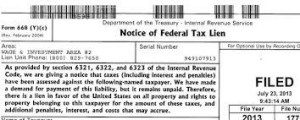 This post discusses the creation and priority of federal tax liens recorded against real estate in New Jersey that has been sold to a good faith purchaser disclaiming any knowledge of the lien’s existence.
This post discusses the creation and priority of federal tax liens recorded against real estate in New Jersey that has been sold to a good faith purchaser disclaiming any knowledge of the lien’s existence.
A Federal tax lien is not a piece of paper. It is a legal claim to a taxpayer’s property. It arises by operation of law when Federal tax is assessed against the taxpayer’s property, and remains unpaid after demand for payment by the United States. A Federal tax lien attaches all property and interests in property owned by the taxpayer at the time it arises, or acquired by the taxpayer during the ensuing ten years. “If any person liable to pay any tax neglects or refuses to pay the same after demand, the amount . . . shall be a lien in favor of the United States upon all property and rights to property, whether real or personal, belonging to such person.” 26 U.S.C. § 6321. Such a tax lien arises at the time the tax is assessed. See 26 U.S.C. § 6322; In re DeAngelis, 373 F.2d 755, 757 (3d Cir. 1967)(“[N]on-payment of taxes after demand creates a lien commencing at the assessment date.”)
In general, “[t]he transfer of property subsequent to the attachment of [a] lien does not affect the lien, for it is of the very nature and essence of a lien [] that no matter whose hands the property goes, it passes cum onere [in effect, with the burden of the lien]”). United States v. Bess, 357 U.S. 51, 57 (1958)(internal quotation marks omitted). Once a Federal tax lien attaches to property, it remains notwithstanding discharge of the taxpayer in bankruptcy. This is one of several reasons why bankruptcy rarely if ever is an effective means of dealing with tax liabilities.
Federal tax liens do not automatically prime all other liens, however. Rather, priority is governed by the federal common-law principle that “`the first in time is the first in right.'”[fn7] United States v. McDermott, 113 S.Ct. 1526, 1528 (1993), quoting United States v. New Britain, 347 U.S. 81, 85 (1954). As stated by Chief Justice Marshall in Rankin & Schatzell v. Scott, 12 Wheat. (25 U.S.) 177, 179 (1827): “The principle is believed to be universal that a prior lien gives a prior claim, which is entitled to prior satisfaction, out of the subject it binds . . . .” 12 Wheat. at 179. It is critical, therefore, for the purpose of determining priority, to ascertain when competing liens, whether federal- or state-created, arise. Likewise, New Jersey is a “race-notice” jurisdiction, meaning that, where there are two competing parties asserting an interest in property the interest of the party who first records the instrument [with the applicable County Clerk] will prevail. Cox v. RKA Corp., 164 N.J. 487 (2000).
While a federal tax lien arises at the time of assessment, for the lien to be perfected against a taxpayer’s residence requires the Internal Revenue Service (“IRS”) to file a Notice of Federal Tax Lien (“NFTL”) in the register of deeds in the County where the taxpayer resides. The NFTL alerts the taxpayer’s creditors that the government has a legal right against the taxpayer’s property, and is intended to prevent third parties who purchase the taxpayer’s property, or lend money to the taxpayer from taking a security interest in the taxpayer’s property, and from acquiring an interest in the taxpayer’s property superior to the Federal tax lien.
So what happens when, after assessment of a tax lien but prior to the recording of the lien, a taxpayer sells his property to a good faith purchaser? Does the purchaser acquire the property subject to the tax lien, or is the IRS simply out of luck?
Pursuant to 26 U.S.C. § 6323, a federal tax lien is not valid” against any purchaser . . . until notice] of the lien] has been filed by the Secretary.” Id. § 6323 (emphasis added). A “purchaser” is defined as a “person on who, for adequate and full consideration . . ., acquires an interest (other than a lien or security interest) in property which is valid under local law against a subsequent purchaser without actual notice.” Id. § 6323(h)(6).
Accordingly, the IRS lien is not valid against a subsequent purchaser if, before the IRS filed notice of the lien, the purchaser qualified “under [New Jersey] law as a subsequent purchaser without actual notice.” Id. To defeat a recorded IRS lien, a subsequent purchaser of the taxpayer’s real estate must record the property deed with the County Clerk before the IRS records its lien in the taxpayer’s County. See N.J.S.A. 46:22-1 (“any . . . deed . . . shall be valid and operative, although not recorded, except as against such subsequent judgment creditors, purchasers and mortgagees”)(emphasis added). The IRS qualifies as a judgment creditor under N.J.S.A. 46:22-1. In other words, to be a “purchaser without actual notice” within the meaning of 5323(h)(6) to defeat the recording of an IRS lien, N.J.S.A. 46:22-1 requires the purchaser to have recorded his or her deed before the IRS lien is recorded.
In real estate transactions the buyer and/or his or her attorney will order a title report and lien search. The existence of any IRS liens properly recorded in the County of the taxpayer’s residence will appear on the title search. On the day of the closing the buyer’s attorney will obtain an update to the title search to confirm whether or not any additional liens appear of record.
The IRS website offers a detailed overview of the federal tax lien process and offers guidance on how to remove liens.

 This post discusses the creation and priority of federal tax liens recorded against real estate in New Jersey that has been sold to a good faith purchaser disclaiming any knowledge of the lien’s existence.
This post discusses the creation and priority of federal tax liens recorded against real estate in New Jersey that has been sold to a good faith purchaser disclaiming any knowledge of the lien’s existence.